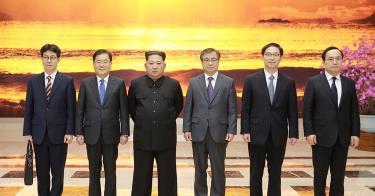Please don’t get starry-eyed over North Korea’s latest “charm offensive.”
When I say charm offensive, I mean press reports out of South Korea that in meetings with North Korea, Pyongyang offered up some fantastical initiatives to possibly reduce tensions on the Korean Peninsula.
For instance, Seoul and Pyongyang confirm that they will hold a summit between North Korean leader Kim Jong Un and South Korean President Moon Jae-in, next month. It’d be their first meeting.
Wait, it gets better.
North Korea is also offering talks with the United States about giving up its nukes and normalizing ties; it won’t test nukes or missiles while in negotiations, either. In exchange, Pyongyang wants unspecified security guarantees.
Granted, North Korea hasn’t confirmed any of this yet.
A delegation from Seoul will visit Washington soon to brief us on its meetings, where we’ll get more detail about Pyongyang’s ploys, er, proposals.
But, seriously?
These North Korean pitches run 180 degrees from what the Kim regime has been saying and doing on its missile and nuclear programs for some time now.
What of the persistent propaganda that portrays America as the enemy? The threats to turn South Korean and American cities into “seas of fire”? Or the fact that Pyongyang has enshrined itself as a “nuclear state” into its own constitution?
The idea that Kim has had some sort of atomic epiphany about North Korea’s nuclear naughtiness after all the time, effort and money he’s put into the program is highly unlikely in my book.
So, which game is Pyongyang playing?
Game No. 1: By offering talks — especially about denuclearization, which Washington has insisted on — North Korea could be looking for a break from the political, economic and military pressure.
For instance, as the two sides consider talks, Pyongyang may bet that Washington — and other countries — won’t pile on any more punitive economic sanctions; a military strike is probably out, too.
Game No. 2: In addition to game No. 1, North Korea could be looking for benefits — “sweeteners” — just for coming to the negotiating table (things like food aid, fuel, sanctions relief or cash) from South Korea and the United States.
Perhaps most important: China. Beijing — Pyongyang’s biggest benefactor and trading partner — could ease the squeeze it has put on its neighbor at Washington’s request.
Game No. 3: Alongside games No. 1 and No. 2, Pyongyang could be working to divide us from our South Korean ally, as it tried earlier at the Winter Olympics. Moon, by far, favors engagement with Kim over confrontation.
While Seoul’s and Washington’s policies have aligned pretty darn well so far, Pyongyang’s questionable diplomacy could push the American and South Korean allies apart, benefiting the North Korean regime.
With this in mind, what should we do?
First, while we learn more and assess the situation, we should continue current policies, including painful, punitive economic sanctions and muscular military deterrence.
Let’s keep our powder dry.
That said, we should be willing to explore discussions with North Korea under the right conditions. We could learn a lot about the enigmatic Kim and what is and isn’t possible.
It’s OK to be cautiously optimistic at this early point, but based on what we know about North Korea, there’s much more reason to be deeply skeptical.
This piece originally appeared in The Boston Herald



